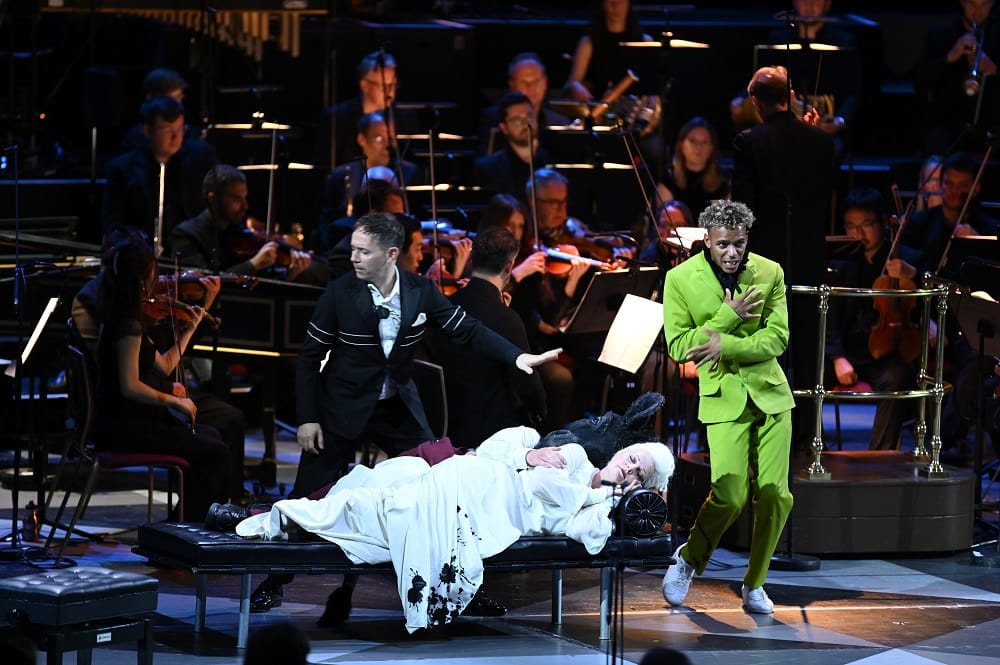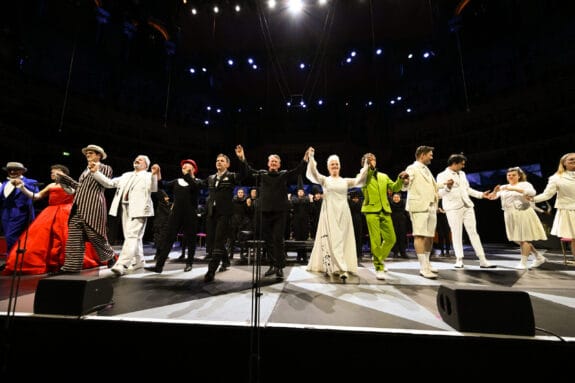Garsington’s Midsummer Magic at the Proms

For its first outing to the Henry Wood Proms, Garsington Opera brought with it not only the luxury vehicle of the Phlharmonia Orchestra, but a crack team of soloists – including one absolutely triumphant substitution – and in doing so confirmed Britten’s A Midsummer Night’s Dream as one of the finest of operas in English.
Netia Jones’ production was intelligently adapted for the Albert Hall by Rebecca Meltzer. Black-clad fairies (fairies in their dark aspect, therefore) were sung by the Garsington Opera Youth Company – some of the finest ensemble singing by young people this commentator has ever heard. Nothing could spoil this performance, it seemed – not even indisposition. Richard Burkhard was listed as Bottom but was replaced by Daniel Vening. It is testament to Vening’s performance that this performance was one of the finest of the night, with no hint of stand-in (I wonder how much of the audience realised as there was no insert – an email had gone out to reviewers, but had it to the general public?). Vening’s third act ‘When my cue comes, call me’ was a masterclass, Britten’s low sonorities adding mystery, the clarinets and flues sinewy lines enhancing the atmosphere. A triumph.
A laudable absence of props allowed focus: a chaise-longue centre-stage, a gyroscope-like contraption. This put the emphasis on the lighting, which was stunningly considered, and perfectly tailored to the present space by Meltzer. But it was Britten’s music, and its realisation via Boyd and his players, that best conjured Britten and Shakespeare’s fairy forest. The staging of the Mechanicals’ play was simply hilarious, a delight (the audience responded accordingly – this performance had both hilarity and depth in its magic).
Counter-tenor Iestyn Davies is no stranger to the role of Oberon, and his celesta-encrusted part was stunningly delivered, right from the off with ‘Well, go thy way’. Davies’ voice has just the right amount of otherworldliness. It has been full 13 years since I saw Davies as Oberon (at English National Opera, 2011, in a cast that included Sarah Tynan and Allan Clayton), and his stage presence has only grown, his immersion in the role only deepened – and back in 2011, that felt fully assimilated already. Vocally, he is faultless, but it is perhaps in his grasp of Britten’s phrase shapes and how best to present them in conjunction with the dramatic situations that impressed most. His Tytania here was Lucy Crowe, a singer who seems to be at the top of her form, her voice sure yet ethereal, and most of all open-toned with no sense of constriction. Perhaps Crowe’s finest moment was the moment where time stops, the act I ‘Come, now a roundel and a fairy song’. Utterly transfixing.
Agile trumpet (Jason Lewis) and side drum announce the trickster figure of Puck, here actor Jerone Marsh-Reid. The part is as demanding physically as it is vocally, and Marsh-Reid seemed tireless in both aspects. As an indication of the attention to detail here, all points conspired to make Oberon’s greeting to Puck (‘Welcome, wanderer’) both on-point and dramatically significant.
As Hermia, Stephanie Wake-Edwards showed a rich mezzo, perhaps slightly oveshadowing Caspar Singh’s tenor Lysander; James Newby’s rich-toned Demetrius and Camilla Harris’ bright-toned soprano as Helena made up the entwined foursome. Christine Rice has never disappointed and here, as Hippolyta, was no exception, hard against a boisterous (and inebriated) Theseus from bass-baritone Nicholas Crawley.

Every single part was carefully cast. The resultant experience was, as it should be, fa more than the sum of its parts. It was Britten’s score that triumphed here, the cogent, secure writing realised almost without fault. Worth mentioning, too that there was a subset that was again more than the sum of its parts: the Mechanicals, James Way a stunning Flute, the experienced John Savournin as Quince, Frazer Scott as Snug and Geoffrey Dolton as Starveling.
Britten’s writing for instruments is complex and often feather-light. The Philharmonia hardly set a foot wrong throughout; co-ordination between players and singers was exceptional.
It was fascinating to do some background listening prior to this Prom in the form of a reminder of the much-missed Richard Hickox, conducing the City of London Sinfonia in a recording featuring the great James Bowman as Oberon, with Lilian Watson as Tytania, Della Jones as Hermia and Norman Bailey as Theseus. Although my physical copy is no longer available (Benjamin Britten Operas, a 13-CD set on Erato), it can be found for download on Amazon here. Not forgetting Britten’s own recording (with Alfred Deller as Oberon), of course (Amazon).
Images © BBC / Chris Christodoulou
PROM 68 Midsummer Night’s Dream
Composer: Benjamin Britteni
Libretto: Shakespeare, adapted Benjamin Britten/Peter Pears
Cast and production staff:
Oberon – Iestyn Davies; Tytania– Lucy Crowe; Bottom – Daniel Vening; Lysander – Caspar Singh; Demetrius – James Newby; Hermia – Stephanie Wake-Edwards; Helena – Camilla Harris; Theseus – Nicholas Crawley; Hippolyta – Christine Rice; Quince – John Savournin; Flute – James Way; Snug – Frazer Scott; Starveling – Geoffrey Dolton; Snout – Adam Sullivan; Puck – Jerone Marsh-Reid.
Sem-staging director – Rebecca Meltzer; Director/Designer – Netia Jones; Conductor – Douglas Boyd, Garsington Opera Youth Company; Philharmonia Orchestra.
Royal Albert Hall, London, UK, 10 September 2024




.png?w=160&resize=160,160&ssl=1)



